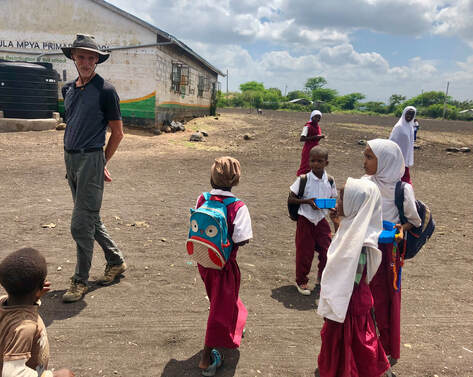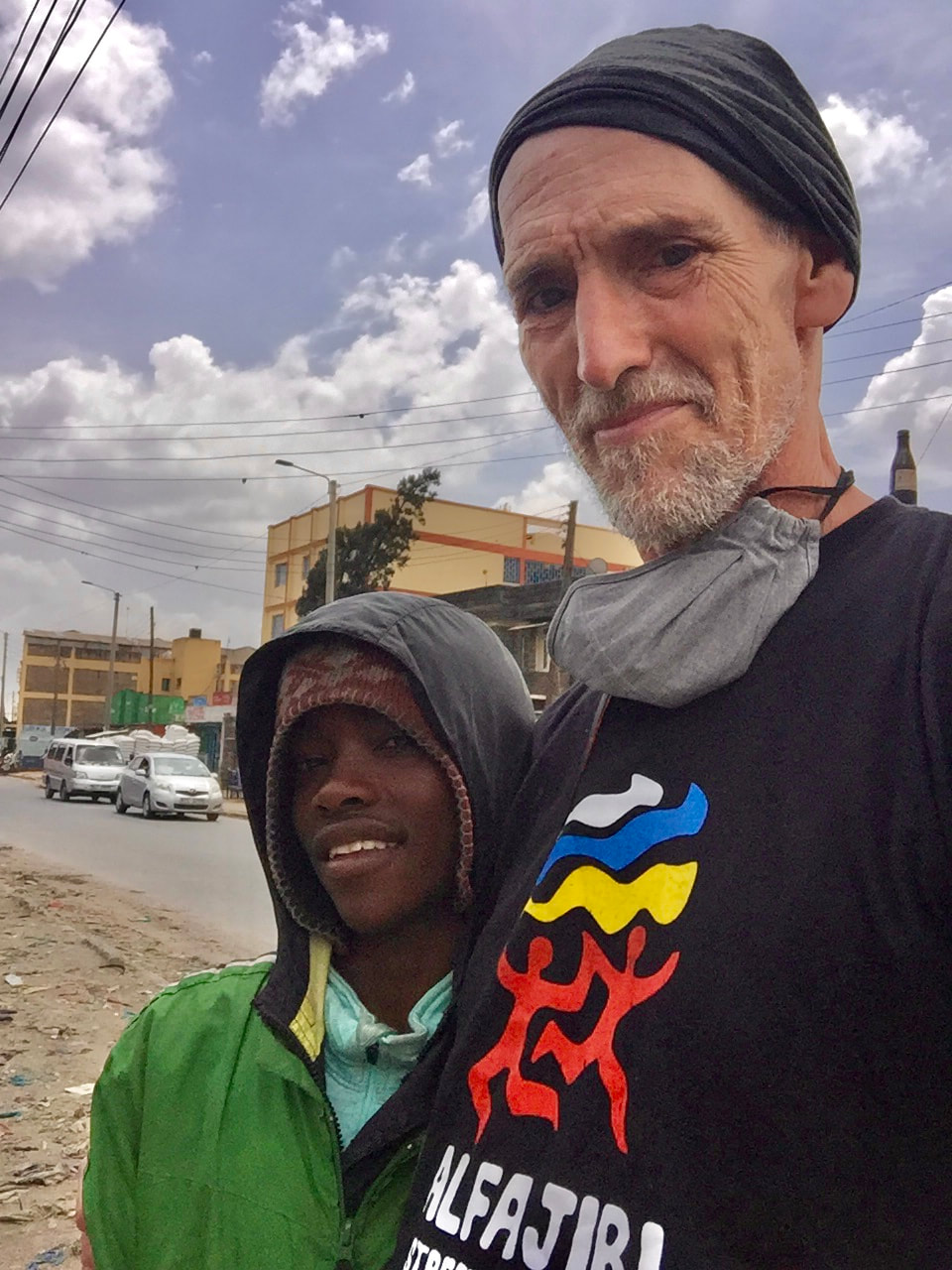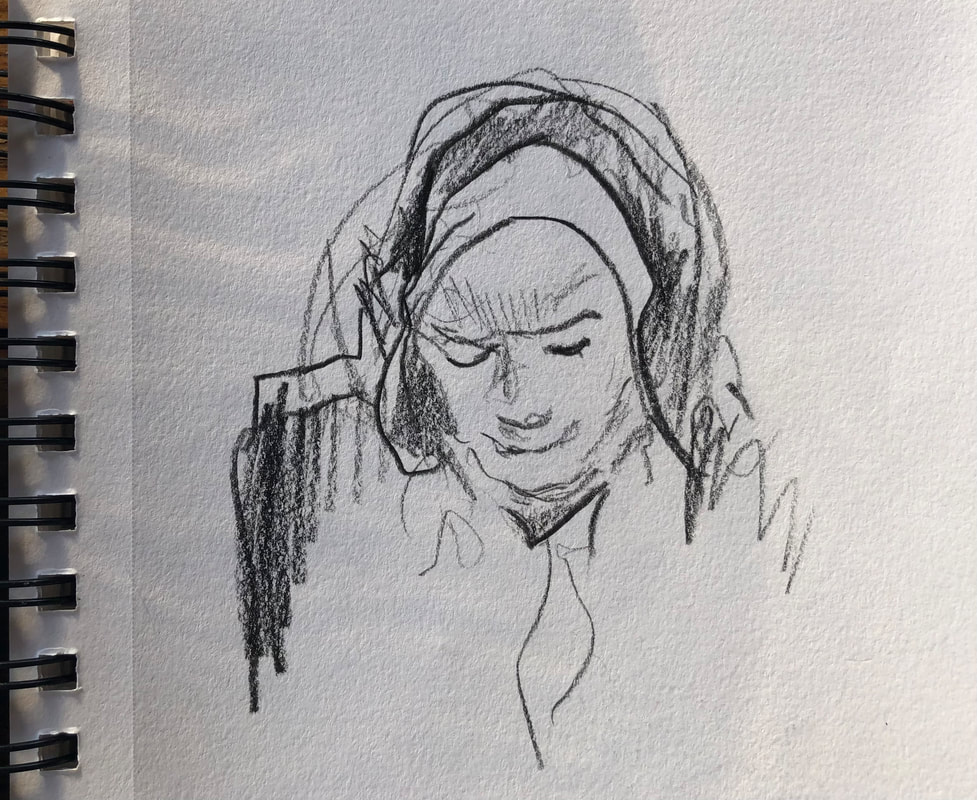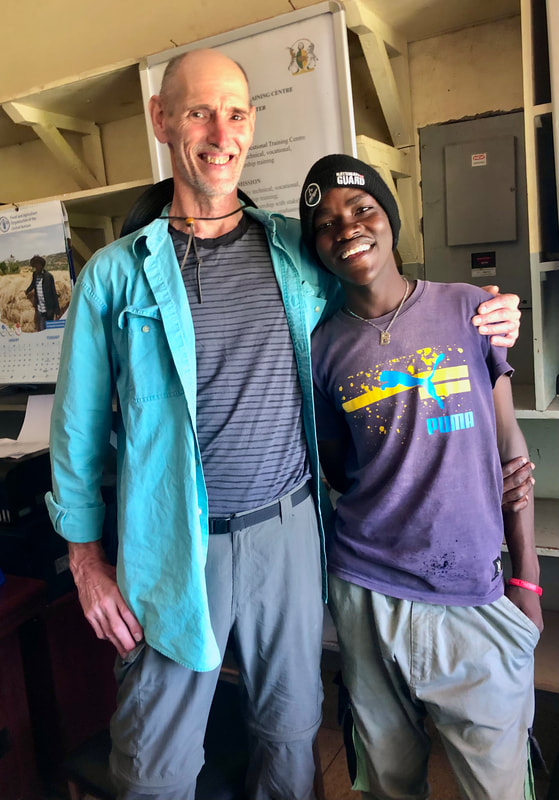
It was mid-winter 2020-21. I was frustrated and deterrmined to get beyond the perhaps well-intentioned but to what I now see as unhealthy social isolation promoted during covid. I’d had enough. I connected with a friend in Rwanda, another I’d never met but been corresponding with in Kenya, and made plans to travel overseas in August 2021. That summer, a new variant prompted another set of restrictions, and my plans were forcibly delayed until Feb. 2022.
Among several light plans, I knew I wanted to experience working with Alfajiri, a non-profit that I’d learned about through my ex-pat artist friend Olivia Pendergast. She’d volunteered with them for some time, and I’d become a supporter from the US. When I came, we did art workshops with a group of “Street Kids”, orphans from the Mathare slum. It was essentially art as therapy, allowing them a few hours reprieve from their otherwise very harsh world. I drew with them, learned a few names and to their delight even drew a few of them. it was a sweet and intense experience. By invitation of the Founder/Director, Ann Lenore Boyd, I accepted going into the slum itself to meet these homeless boys at their “base.” We went along with her super capable and compassionate Deputy Director John Paul Wasiro.
I’ve written elsewhere attempting to describe that visit; suffice to say unless one is completely insensitive to others, it’s a life-changing thing. We were led to the base, a tucked away corner between shacks that served as the boys’ momentary spot. They’re often victims of abuse prior to becoming “street boys” and this continues after they get out of their tragic home situations. They have to keep moving like nomads as everyone else in the slum (and authorities outside it) despise them and routinely will beat them, in part because they have to connive and steal to survive, but also understandably because living in the severe poverty within a slum exacerbates all sorts of angers, mental illness, addictions and suffering for everyone.
I saw some familiar faces from the workshop, and they were thrilled someone who said they would come considered them enough to actually enter their world, however briefly. Among them I noticed one named Ibrahim. I recalled he’d done an incredible drawing with no reference image, of a very detailed three-dimensional automobile. I’d also happened to draw him. There was something about his quiet focused presence that struck me and contrasted with the mostly extroverted kids.
When I approached him in the slum, like some others he was holding a clenched fist to his chin. I learned that moment they were sniffing jet fuel to sustain a high, which no doubt helped them cope with their tragic circumstances as well as relieve their constant hunger pangs. I gave him my attention and asked him to show me what was in his hand. He was hesitant, but for some reason eventually relented. I gently suggested he could do without it, and that he toss it into the open sewer trough in front of us. After a delay, he agreed and tossed it. I was glad in the moment, but truly the incident was among dozens I took in that day, and hundreds on that first trip to Africa. I learned later that as an infant he’d spent a year in hospital with a severe concussion, was not expected to survive after being thrown against a wall by a male in the household. Like so many here, it was near miraculous he was alive.
To my great surprise and happiness, when I was back in the US months later, John Paul and Ann let me know Ibrahim had indicated he wanted to try and find a way out of the slum. They credited my “influence,” but he and the entire Alfajiri staff all deserve great credit for their courage, patience, and perseverance, even amid some back steps, as eventually they were able to get him back to his hometown Isiolo, a four and a half hour drive from Nairobi, where his mother lived with two younger siblings. As crucially, they got him back in public school, which means the world to young Kenyans in ways Americans can barely comprehend from a distance.
Even so, not surprisingly he still faced many challenges, related to abuse from older men in the household, and his previous yet understandable distractions of the street and addiction. Slowly, through the efforts of people like John Paul and a few big-hearted teachers, things stabilized about a year in. Then, his mother became ill and due to the circumstances of her poverty, was unable to receive good medical care in time and sadly died. Ibrahim had been so devoted to his mom, was suddenly tossed into the terrific grief of losing the mother he had just recovered. Amid all this he bravely said he wanted to quit school, because he now needed to take care of his younger siblings. Yet again, Alfajiri staff and others stepped in to guide and support him, and found ways he was able to stay in school.
At the same time, late summer in the US of that year, my beloved brother in law had passed unexpectedly, and soon after my own mother. Although there was no way to directly communicate with him, through John Paul, I was able to convey my condolences as well as our now shared loss. Ibrahim hung in there. Every few months I would check in and ask about him, or get a report from Ann or John Paul on how he was doing. They always conveyed that he kept me in mind and was very grateful. Months later, I was extremely happy to learn he had graduated primary school.
When I visited last year, 2023, he was still doing well but I was unable to fit in the long trip to see him and he did not have the time nor means to catch the arduous public bus ride to Nairobi. In late 2023, I received a photo of Ibrahim, revealing he was now taller than John Paul! The diminutive, quiet kid I’d met had begun to sprout and his beaming smile verified he was feeling more confident. John Paul said they often see such growth with the kids they rescue and empower — the result of letting go of drugs, access to a steady diet, and a bit of security and care. I made the commitment in my mind I’d have to see him on my trip to Kenya this year.
So this week a trusted friend and driver Paul Goto, whom I’ve had the good fortune to get to know took John Paul and I on the full day journey to Isiolo and back. It’s hard to convey the differences in how time is perceived in Kenya (and I suspect many less-developed parts of the world) compared to the US. Kenyans generally are on what I might call “life” time — things take as long as they require. In many ways human interactions and relations are still a priority over getting to a meeting (or any planned location) at a certain prescribed time. One can fight it here or embrace it; even in the US, I’ve always been more at ease with the latter.
Isiolo was vaguely like Nairobi, but I felt much more Muslim influence, the merger making it unique unto itself. After the long drive, we met Ibrahim’s stepsister Farina, at a local restaurant. She’s only 22 and has kids of her own (Ibrahim is now 16), but had agreed to help him and his siblings as she was able. She was dressed in traditional garb, and understandably shy, being a young Muslim woman dining with two male strangers, having only met John Paul beforehand.
We broke bread, and then she guided us to Ibrahim’s former school where his younger brother was now a student. The “roads” were extremely rough, barely navigable dirt alleyways. We wound through a veritable maze for 20 minutes. Paul, our driver, fielded everything with typical patience and skill. I was happy to meet Ibrahim’s 13 year old brother, as all the kids at the school stared wide-eyed at me. It occurred to me that from 6 AM when I left the airbnb, all along the route, and even within the bustling town during lunch time, thousands of people milling in all directions, through the economically-depressed rambling neighborhood that led to this school, I had not seen a single light-skinned person. So yes, no surprise these young kids were all excitedly trying to figure me out. Some were cautious, many giggled, others boldly shouted “Hallo!” or “Jambo!” As always our shared smiles quickly softened things and soon they were laughing at me and with me.
After discussion with the teachers, we headed with him and his step-sister to Ibrahim’s new school. The classrooms are spartan, open-air block buildings, as the climate in Kenya generally allows. This was a trade school, teaching several professions: hairstyling, dress-making, woodworking, mechanics, and welding, which is what Ibrahim’s just begun studying. On arrival, we learned it was lunch break, and Ibrahim had gone out. We waited about 90 minutes, John Paul doing his best to locate him. Admittedly, lack of reliable cell service and accessibility to devices also contributes to accepting life as it unfolds. Farina found some shade under an acacia bush and I sat on a rock next to her. We traded smiles a few times and settled in, trying not to waste energy in the hot midday sun.
Finally, over nine hours after leaving my lodging in Nairobi, I saw Hussein stroll into the compound. He looked so confident and was now approaching 6 ft! We greeted each other with huge smiles and a hearty hug. The headmaster graciously allowed John Paul, Ibrahim and I the privacy of his office and we had nice visit. Although we now share in this mysteriously manifested relationship, Ibrahim and I have barely ever conversed. In addition, he’s not fluent in English, nor I in Kiswahili although, as I told him, he’s far more advanced in it than I in his tongue! John Paul interpreted for us and helped retain the nuances of what each of us conveyed.
Slowly the chat warmed to where we were tossing bits of humor back and forth. I was grateful to be able to share my condolences directly about his mother and my own losses. I tried to impress upon him my great happiness in all his achievements: climbing out of his circumstances, shedding his addiction, helping with his siblings, holding on through very challenging situations at home, and working hard in school. He told us he found football (soccer) to be a great discipline that he really enjoys (and apparently is very good at). We all agreed he had to keep focused on the first year of welding as the headmaster told us it was crucial to lay the foundation for completing the certificate. Yet then he laughed and said his football coach tells him he needs to focus on football! So we suggested balance was going to be very important this next year. He insisted he would not let me or himself down. I tried to convey he couldn’t disappoint me, as I was already so very proud of him.
Our brief time was filled best we could. I don’t know that I’ll be able to communicate with him directly (possibly via email or FB) but that’s another challenge we hope to sort out. All I know is during this long-anticipated meet-up and conversation in that headmaster’s office at the spare trade-school compound in Isiolo, I felt the presence of both of my parents.
As we headed to the car for the journey back to Nairobi, Farina was still patiently waiting in the shade. I spontaneously reached out my hand to help her up. Only after she grabbed it and we had walked many paces hand in hand, did it occur to me what a special, very sweet, genuine gesture of trust this was.
In our chat, Ibrahim mentioned to John Paul he’d outgrown most of his clothes and had passed them onto his younger brother. I laughed and told him the same had happened to me years ago! By intuition I’d brought a hoodie and long-sleeve T-shirt to give him, and handed them to him as we parted ways. He was very appreciative and thankful. “I love you,” I said as we departed. “I love you too,” he said.
On the long ride home, several times I felt tears well up, as I marveled at our meeting, and the grand and beautiful mystery of how such utterly different life paths might never have crossed if any small aspect of the last three years in the lives and actions of everyone involved had been slightly different. Yet a thread of love pervaded all. We are indeed inextricably intertwined far beyond our capacity to comprehend. Ever abiding love is always there, behind the distractions, and with just a bit of opportunity is revealed, blossoms, and unites us.
Alfajiri.org



 RSS Feed
RSS Feed